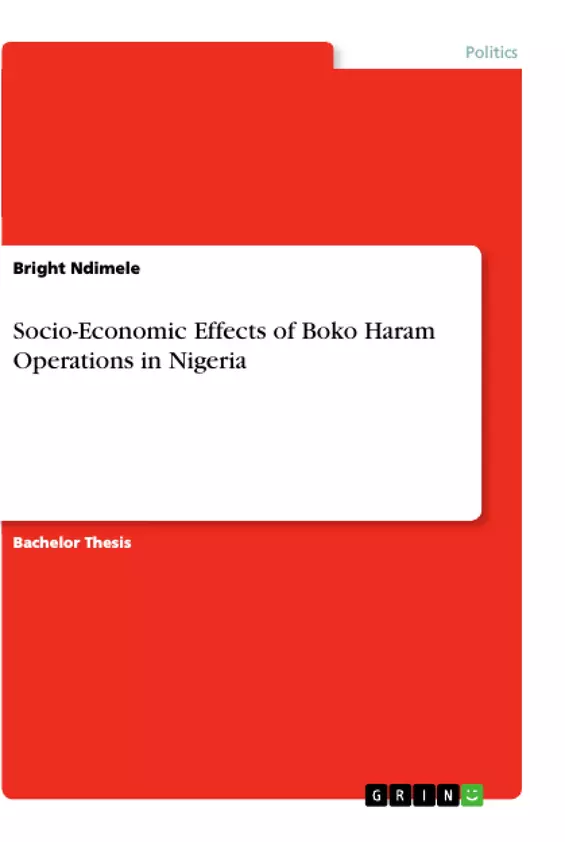The Nigerian State since 2009 has been under the throes of the deadly terrorist operations of the Islamic sect formally known as JamaatuAhlis Sunna Liddaawati Wal-Jihad. This sect famously dubbed Boko Haram, meaning western civilization/education is forbidden, claims to be on a mission to Islamize the Nigerian State. Prima facie, Boko Harams motivations appeared to be religious; however considering factors as dismal socio-economic conditions that prevail in the Northern region, the epicenter of the sect, a religious explanation alone is reductive.
More so, relevant and related literature was reviewed using conceptual and theoretical approaches. A threefold theoretical framework constituting of Marxian, Relative deprivation, and Frustration aggression respectively were adopted to explain the phenomenon. Unlike other authors who have hinged the operations of the sect to a kind of political undertone; this study deems fit to establish the poor socio economic conditions especially in the North eastern region which have been serving as a veritable ground for the sect quest to gradually dethrone the legitimacy of the Nigerian State. This study also exposes the extent of the damage further caused by the sect violent operations as well as the suitability of the “carrot and stick” strategies or policies in dealing with the sect negative impact.
Hence, this study employs secondary source of data from library materials, newspapers, journals, articles and so on.
The findings revealed that the strategies of Nigerian government failed because she failed to address adequately the socio-economic factors that equipped the sect such as unemployment, poverty, corruption/bad leadership, poor economy structure. The research further exposed that the strategy used in curtailing militancy in the Niger Delta region of Nigeria failed to tackle terrorism in the North Eastern part of the country which can be regarded as the nerve of the sect because of the international affiliation and its religious connotation to terrorism.
Inhaltsverzeichnis (Table of Contents)
- Dedication
- Acknowledgement
- Table of contents
- Abstract
- CHAPTER ONE: INTRODUCTION
- Background to the Study
- Statement of the Problem
- Research Questions
- Objectives to the Study
- Significance to the Study
- Research Methodology
- Scope of the Study
- Limitations of the Study
- Chapter Outline
- CHAPTER TWO: LITERATURE REVIEW AND THEORETICAL FRAMEWORK
- Introduction
- The Concept of Terrorism
- Types and Dimensions of Terrorism
- Causes of Terrorism in Nigeria
- The Origins of the Boko Haram Sect
- Ideology and Agenda of Boko Haram
- Religious, Political and Ethnic Justifications of the Boko Haram Sect
- Ethnic Justification
- Religious Justification
- Political Justification
- Theoretical Framework
Zielsetzung und Themenschwerpunkte (Objectives and Key Themes)
This project aims to analyze the socio-economic impact of Boko Haram's operations in Nigeria from 2009 to 2014. The study seeks to examine the direct and indirect consequences of the group's activities on the Nigerian economy and its social fabric.
- The origins and evolution of Boko Haram
- The socio-economic impact of Boko Haram's operations on communities in Nigeria
- The role of the Nigerian government in addressing the Boko Haram insurgency
- The impact of the insurgency on the Nigerian economy and development
- The potential for long-term socio-economic recovery in areas affected by Boko Haram.
Zusammenfassung der Kapitel (Chapter Summaries)
Chapter One provides an introduction to the study, outlining its background, statement of the problem, research questions, objectives, significance, methodology, scope, limitations, and chapter outline. Chapter Two explores the theoretical framework and literature review, delving into the concept of terrorism, including its types, dimensions, and causes in Nigeria. It also examines the origins, ideology, and justifications of the Boko Haram sect, including its religious, political, and ethnic dimensions.
Schlüsselwörter (Keywords)
This study focuses on the socio-economic effects of Boko Haram's operations in Nigeria, exploring the impact on the economy, social fabric, and long-term development. Key areas of focus include terrorism, insurgency, Boko Haram, socio-economic impact, security, government response, and recovery.
- Quote paper
- Bright Ndimele (Author), 2018, Socio-Economic Effects of Boko Haram Operations in Nigeria, Munich, GRIN Verlag, https://www.grin.com/document/918067



